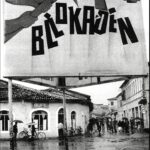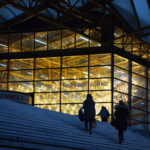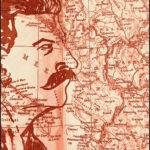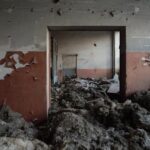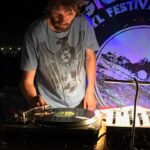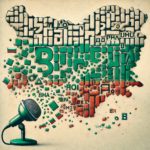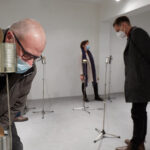Out of Noise
Reaction to Antoni Rayzhekov’s Artistic Performance ‘The Evasive Choir’
What happens when the rigour of science meets the intuition of art? When data and creativity are placed side by side with metaphor and movement? The International Academic Week 2023 offered a living, breathing answer. It unfolded like a kaleidoscope of voices and visions, an emotionally resonant journey into the heart of transition as experienced across South-East Europe. The symposium’s true success lay not only in convening artists and scientists under one roof, but in allowing their disciplines to collide, overlap, and challenge each other. Here, the theme of transition became more than a theoretical object; it was transformed into a vibrant, contested terrain where archives, performances, and imaginations coalesced.
As a young researcher in visual anthropology working on the ethno-photographic archives of the Albanian Communist dictatorship, I was particularly moved by the artistic contributions that drew on the social representations and collective imaginations of the Balkan countries. Of all the proposals that struck a chord with me, I was left speechless when Bulgarian artist Antoni Rayzhekov presented us with the performance art piece The Evasive Choir, which he created in 2021 at The Institute of Contemporary Art in Sofia (ICA-Sofia).

Tutzing, a Wednesday in October 2023.
After a morning devoted to the contemporary challenges of safeguarding socialist heritage in the Balkans, followed by a short coffee break on the sunny terrace of Tutzing’s Academy for Political Education, we were plunged into the darkness of the conference room where all the blinds had been closed. It was pitch black and we could hardly see anything. Antoni Rayzhekov stood by the lectern, presenting a work that was both conceptual and sensory, which he invited us to see, to listen to, to interpret, to question, and most importantly – to feel.
The Evasive Choir
Its evocative title immediately conjured in me the traditional polyphonic songs of the Balkans, particularly those I have heard in the mountainous regions of northern Albania, songs originally sung across ravines, from one shepherd to another. But Rayzhekov’s choir does not harmonize; it stammers, buzzes, and hesitates.
He launched a video of the performance as installed between the walls of the ICA-Sofia, accompanied by photographs showing the visitors navigating the installation like cautious intruders in a sonic forest. A syncopated buzz emerged. From the floor of a sterile white cube, tripods rose like bare trees – skeletal, patient – each equipped with small loudspeakers hidden inside tin cans. On each tripod, a label in Bulgarian identified a political figure, followed by the date and context of a speech. From these cans escaped the “huummm”, the “eeuuu”, the “aannn” extracted from their otherwise mundane political speeches.
These sounds were not the meat of rhetoric, but its connective tissue – its hesitation, its breathlessness, its unconscious anxieties. They were the discursive pauses where meaning gets lost or perhaps gestates. Rayzhekov amplified these in-between moments, making them grotesque, uncanny, plaintive, and beautiful.
At first, I was mesmerized. Then, a little uncomfortable. Was this art too clever for its own good? I found myself wondering: would someone unfamiliar with the Bulgarian language or political context grasp the depth of this critique? Was the experience inaccessible, or deliberately exclusive? My awe began to mingle with doubt. Rayzhekov himself seemed aware of this risk. He spoke of a “national silence” plaguing Bulgarian political thought since 1989, of media swamps and democratic malaise. His work, then, was not simply conceptual provocation, but a direct response to a political condition. The cumulative litany of verbal disfluency became his protest anthem, not mocking political speech but performing its difficulty. Its human mess.
Yet is silence always a void? Sometimes it holds space for healing, contemplation, even dignity. Might these “ums” and “uhs” also reflect a kind of struggle for sincerity? Could they not, paradoxically, signal an effort to say something true, to resist propaganda’s polish? I began to see this work not only as a critique of the failure to speak clearly, but also as a lament for the impossibility of clarity itself in the face of historical trauma. What emerges from a people who have been systematically taught to mistrust language?
Another layer of complexity struck me as I considered our mode of access. We experienced The Evasive Choir not in situ, but through mediation – via video, photos, and the artist’s oral account. We were not inside the soundscape but watching it from outside. This estrangement, I realized, mirrored the post-socialist condition Rayzhekov describes: a society watching itself speak through a glass darkly.
The tin cans were a brilliant choice. Objects of preservation turned into objects of decay. Normally used to store food, here they contain the waste sounds of history. It made me wonder: was this an archaeology of voice, or a necrology? Are we preserving these sounds to understand them, or to mourn them?
There is a danger in over-intellectualizing art like this, in piling metaphor on metaphor until the original soundscape is buried beneath analysis. But Rayzhekov’s piece resists that fate, because it does not demand understanding, it demands presence. You don’t need to grasp every reference to feel the claustrophobic resonance of those sounds, and the emptiness stretching between words. As his presentation concluded, a silence fell. A real one. Not performative, not curated. Just stillness. Then, spontaneous applause. We clapped, not only for the piece, but perhaps for the courage to dwell so long in discomfort. Over lunch, the conversation continued. We debated whether art like this should offer solutions. I don’t think it should. Its power lies in confronting us with what is unresolved. The Evasive Choir does not offer a blueprint for post-socialist reform. It offers the sound of thinking interrupted.
Weeks later, the piece still echoes in me. It has made me suspicious of fluency, wary of speeches that glide too smoothly from promise to promise. It made me ask: what are we not hearing in the transitions of our societies? What voices have been edited out?
The protean concept of transition we have been examining over the course of the week seems to crystallize here. It is the sound of ideas trying to be born but tangled in their own umbilical cords. And so I now see this work not as a condemnation of speech, but as a radical listening. A listening to the noise beneath the noise. To the voice behind the voice. To what a nation mutters in its sleep.
And what it forgets to say when it wakes up.




